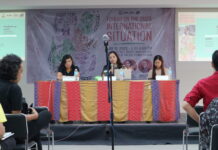Many observers agree: it is not the February 1 military coup that’s surprising in the recent events in Myanmar. What’s surprising, and inspiring, is the non-stop, broad and fierce resistance that the people are mounting against the coup and the military junta that it installed.
Myanmar’s elite democracy, after all, remains young and fragile, and the Tatmadaw has retained firm control over the country despite the end of open military rule in 2011. Instead of acquiescing to military rule, however, the people of Myanmar are choosing to confront the junta with resistance.
They have every reason to do so. Despite the flaws of elections in elite democracies, the solution lies not in a military takeover and declaration of a state of emergency. It lies not in the arrest of the November 8, 2020 elections’ landslide winners Aung San Suu Kyi and leaders of her National League for Democracy, as well as members of the electoral commission. These moves signal a turn for the worse.
The US, European Union, United Kingdom and Australia have condemned the coup, and the first two have taken action against leaders of the ruling State Administration Council. Consistent with their practice of shielding countries, especially their ally Myanmar, from international scrutiny and criticism, China and Russia vetoed a United Nations Security Council statement condemning the military coup. This, even as Suu Kyi has moved closer to China in recent years and Myanmar’s military is known for being critical of the Asian superpower.
Global powers have made either a clear or muddled response to the coup, but the people of Myanmar have responded unequivocally and exposed the coup and the junta to be illegitimate. An estimated half of the country’s population has participated in protests, in which hundreds of thousands participate. Many have refused to work, including crucial health workers and government employees. The youth have been vigorous in joining protests, and their parents have been giving them their blessings. Inspired by protests in Hongkong and Thailand, they have invented and used creative forms of protest.
The junta has reacted with characteristic and condemnable brutality. According to human rights group Assistance Association for Political Prisoners, 738 civilians, including more than 30 children, have been killed in the protests and in their homes, more than 4,000 have been arrested, and 3,261 remain in prison. Serious and widespread human rights violations continue to be committed.
The people of Myanmar continue to make their demands loud and clear: an end to the military junta and a return to civilian authority; the release of Suu Kyi, NLD leaders and all political prisoners; the dropping of charges against those arrested and imprisoned; upholding the results of the November elections; among others.
Beyond these, however, the people of Myanmar have a lot of work to do in building genuine grassroots democracy and upholding human rights, especially in relation to curtailing the powerful Tatmadaw. The coup once again showed that Mao Zedong’s dictum “political power grows out of the barrel of the gun” is not only an imperative for revolutionaries, but a truism of political science.
Much needs to be done to a military that serves its own interests, not those of the people; that actively intervenes in politics and governance, and does not respect civilian supremacy; that upholds the interests of local elites and foreign powers; and that violates human rights and the rule of law itself.
That is why the Myanmar protests are most encouraging. The people of Myanmar seem ready to fight not only for the immediate needs of the movement for democracy and human rights, but for the long-term and systemic ones as well.
The people of the world have raised their “Hunger Games” three-finger salute to the people of Myanmar. They are called upon to do more to show their solidarity, until victory in this tactical battle is won. ###


















